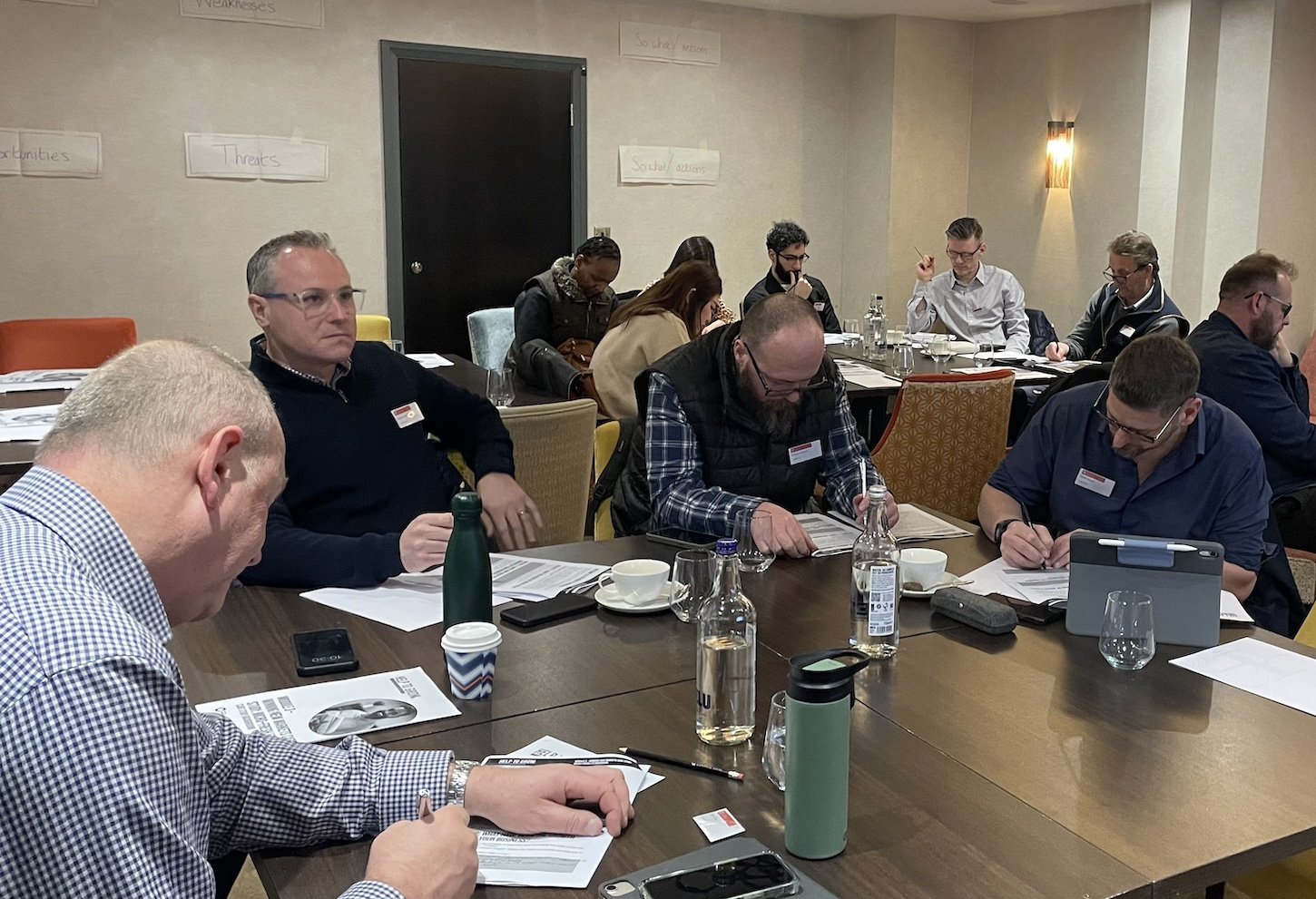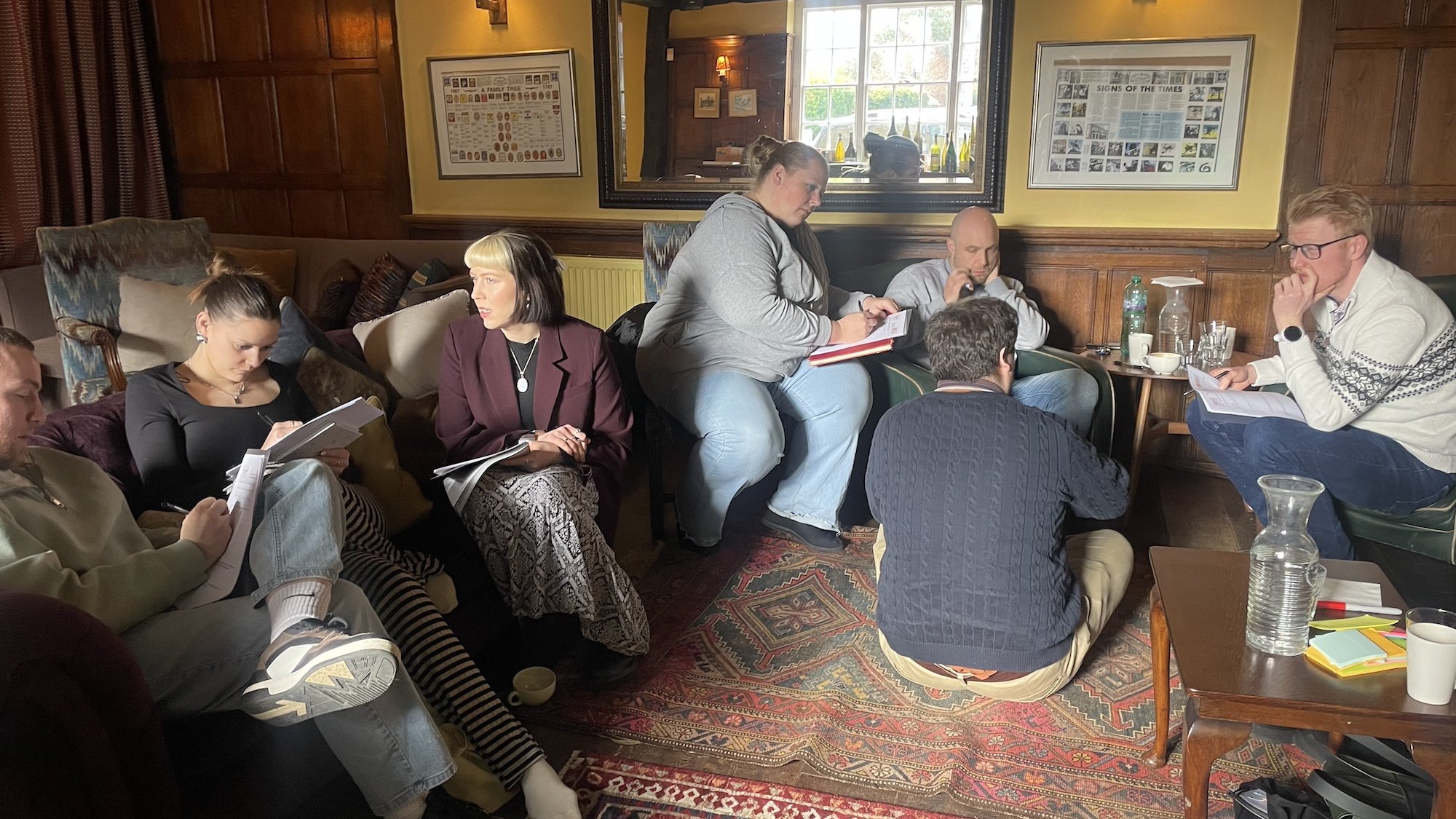
BLOG
Inspiration and news
Planning Leadership or Management Development - Start with 10 questions.
Is your leadership or management training really working, or just ticking a box?
Before you invest in another leadership or management programme, ask these 10 essential questions. This practical guide helps you plan training that’s aligned with your strategy, culture and values and genuinely builds confidence, connection and skills in your people to drive lasting behavioural change.
How do you make sure that your next leadership development or management training programme is successful? How can you be sure that it will be engaging and that learning will stick?
It may be tempting to opt for a quick fix, such as off-the-shelf training or e-learning modules, but will people engage with them? Will it feel relatable and relevant, or just like a tick-box exercise?
64% of managers said they would “look for another job” if their organisation failed to support their professional development, according to the Building Better Managers report (Mindtools 2025), which surveyed more than 2,000 UK managers. The results make for interesting reading:
80% of the managers surveyed were promoted because they were good at their job, not because they wanted to manage people.
Half of the managers surveyed received no support from their organisation (resources, formal courses or training) when transitioning into a management role.
Only 58% of those who did said that they were satisfied with the support they received.
72% of managers rank emotional intelligence in their top 5 most-needed skills; yet, few have ever been supported to develop it.
41% of managers say: “I want to discover my strengths and weaknesses.”
40% want to know “what my organisation expects me to focus on.”
Having difficult conversations was identified as a top challenge for managers.
Only 37% of managers feel confident in goal-setting
So, how can you be sure that the financial and time investment will be worthwhile, create a long-term impact and ROI? Before you start planning or buying a development programme, begin with these 10 questions.
10 Questions to Ask before Planning a Leadership or Management Development Programme
What problem are we trying to solve?
Being vague about the purpose of the training will lead to vague outcomes, so clarify and define what gap the training needs to close, what problems it will solve and why now. The more specific you can be, the more targeted and effective the training intervention will be.
What are the specific skill gaps we see in our managers and leaders?
What problems is this causing?
Are there inconsistencies in leadership behaviour or expectations?
Why do we need the training now?
2. How will we know if it worked?
It’s not enough for leadership training to feel useful; you need to know it made a tangible difference. Before you start, agree:
What would success look like?
What would managers feel, think and do differently?
How would it impact the wider team and the business?
What behaviours, outcomes or shifts would tell us this was a good use of time and budget?
What can we track and measure?
Consider tracking:
Engagement or pulse scores (e.g. “I have confidence in my manager”)
360 feedback before and after the programme
Self-assessed leadership confidence or readiness
Retention and internal promotion rates
3. What’s the current reality for leaders in our business, and what’s missing?
What is the day-to-day reality for your managers and leaders?
What are they finding hard?
Do our leaders know what’s expected of them?
What leadership behaviours drive our culture?
What themes come up in surveys, exit interviews or coaching conversations?
4. Who is it for?
Leadership development training isn’t one-size-fits-all, so define the audience, their roles and levels of experience.
Are you supporting new, stretched or experienced leaders?
What support or training have they had before?
How do they learn best? (in person, on-the-job, through talking, reading, watching or doing?)
Do they have time?
Will they engage and commit to the programme?
5. How do we align the programme with our culture, values and strategic priorities?
Does the training support our strategic priorities?
How will it support our culture and brand?
What new capabilities or behaviours will leaders need to meet future challenges?
Are there behaviours we’re seeing that contradict the culture we want?
Are leaders role modelling those values, or accidentally eroding them?
6. Will this build leadership self-awareness and confidence?
Building confidence and developing emotional intelligence are just as important as training in hard skills and ‘soft skills’.
Do our leaders feel confident to give feedback, set direction, or hold others accountable?
Are they avoiding difficult conversations?
Are we supporting emotional intelligence, resilience, and self-awarenes?
7. How will we make it stick?
According to ATD, only 20% of training participants apply what they’ve learned unless there’s reinforcement. Training is just the start of the journey.
How will we embed and follow up the training?
How do we encourage people to practise what they’re learning?
Will there be coaching, peer learning, or follow-up?
Will line managers support the training, allow time away from the desk and encourage practice?
8. How will we create psychological safety during the programme?
People need to feel comfortable and able to express themselves, ask questions, and share ideas safely. Ask:
Will the space be inclusive, supportive and confidential?
How do we ensure everyone’s voice is heard - even the quieter ones?
Will participants feel safe to ask “obvious” questions?
Can they talk honestly about where they’re stuck?
9. Who will design and deliver the training?
Do we need something fast, simple, and off-the-shelf, or something designed around our people, our goals and our culture?
Do we have the capacity and expertise to design and deliver this internally?
Do we need external partner to design and deliver the programme?
Would a public or open-access course meet our needs?
There’s no one right answer — but there is a best-fit approach for your context.
Off-the-shelf vs bespoke: what’s right for you?
Off-the-shelf might work if you need speed, scale, or consistency across a large group with baseline knowledge needs.
Bespoke is better if you’re solving complex cultural issues, supporting strategic change, or developing a specific set of behaviours aligned with your values.
10. Should we facilitate internally or bring in an external Facilitator?
Internal delivery may save money, but it can limit openness. It’s also tough to be both the facilitator and a full participant. External facilitators bring fresh eyes, neutrality, structure, and psychological safety, especially helpful when trust is low, behaviour needs to shift or a big change is underway.
When choosing an external facilitator, experience and credentials matter, but so does chemistry, emotional intelligence, and the ability to build trust quickly. So look for someone who designs training from real-world experience, not just theory; gets your sector, culture and context, can flex tone, structure and content in the room and will challenge, not just cheerlead.
Final Thought
According to IBM, companies that invest in leadership development see up to a 37% improvement in business performance. (IBM Smarter Workforce Study).
If after you’ve answered these questions, you would like help to co-create and facilitate a leadership development or management training programme that makes a difference, I’d love to help.
Get in touch to discuss how I can help
Polly Robinson, Growth Space
We design tailored human-centric programmes that are relevant and relatable for your people, your culture and your organisation. I work as a strategic partner, coach and facilitator to help you get to design and deliver programmes that make a real lasting difference.
Everything is tailored - we don’t use templates or jargon.
We’re known for warmth, energy, deep listening, strategic thinking and clarity.
If you’d like to explore how we can help get in touch with Polly:
Call: 07966 475195
Email: polly@pollyrobinson.co.uk
Book Zoom call with Polly via Calendly >





